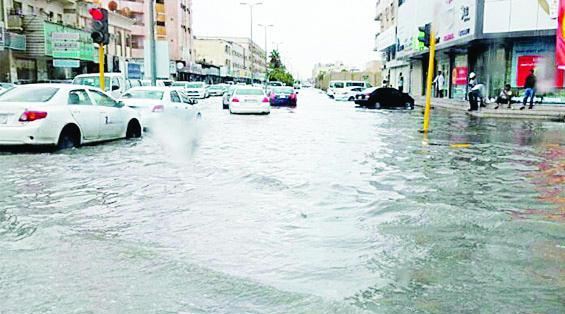 Jubail, Jan 8: Jubail residents have called on major companies in the region to help clean up and rebuild parts of the city hit by severe floods on Monday.
Jubail, Jan 8: Jubail residents have called on major companies in the region to help clean up and rebuild parts of the city hit by severe floods on Monday.
They accused certain private industrial companies of making billions every year but not using this money to help improve the city’s infrastructure and provide jobs for Saudis.
Ahmed Al-Qarni, a resident, said: “The population of the city has increased because these companies and their employees occupy towers and compounds. These companies have offered nothing to Jubail. The employees have become a burden on the city that has been neglected by officials.”
Raeed Al-Harbi, a resident, said that Jubail city is predominately occupied by employees of big companies. “These companies insist on housing their employees and workers in Jubail even though they work at Jubail Industrial City and Ras Al-Khair. This has caused rentals and housing prices to increase.”
“In addition, they have not contributed to the city’s infrastructure, which is deteriorating all the time.”
Hussain Al-Qarni, another resident, said: “I think that the municipality has not succeeded in doing its job to provide for this huge population. Most of the city’s inhabitants are now employees of the private sector.” He urged the municipality to pressurize the companies to help out.
Fadil Albuainain, an economic expert, said government should pass laws forcing these companies to set up a fund with SR50 million deducted from their annual profits to help upgrade Jubail’s infrastructure.
“Jubail has not received any financial contribution from the industrial sector even though the city has been the most affected by the procedures of various companies, which has also placed pressure on facilities from too many workers.”
Albuainain said these companies should place the city on top of their social responsibility programs. He said the industrial sector in Jubail makes almost SR35 billion a year in profits. “It’s not acceptable that they do not give back to the city.”
“The huge factories of these companies surround Jubail and endanger the city and its environment. They also endanger the health of residents.”
Albuainain said that the companies would not provide support unless an official body forces them to do so. He said laws and regulations should be strengthened to ensure companies deliver on social responsibility projects.
“The industrial sector has many responsibilities toward the community including providing jobs for Saudi citizens and qualified graduates from Jubail who are unemployed in the largest market for industrial jobs in Saudi Arabia.”
“There are many other responsibilities they must take up including building schools, medical centers, social centers and sports clubs. They should also create gardens and support charities.”
“Companies should support development programs and fix critical issues. They should actively contribute to merging the Jubail community with the workers in the industrial city.” He said the two communities should not be separated in a “society that ensures equal rights for all.”
Jubail Mayor Naif Al-Dawish said some companies have contributed to the local community. “The city demands more because it has become the workplace of the country’s biggest industrial companies. We are ready to help companies fulfill their responsibilities toward society and help the city become prosperous.”






Comments
Add new comment